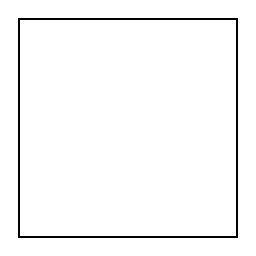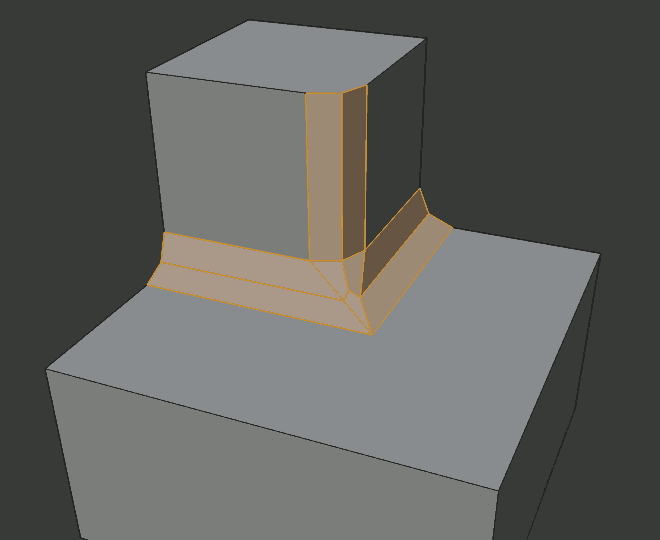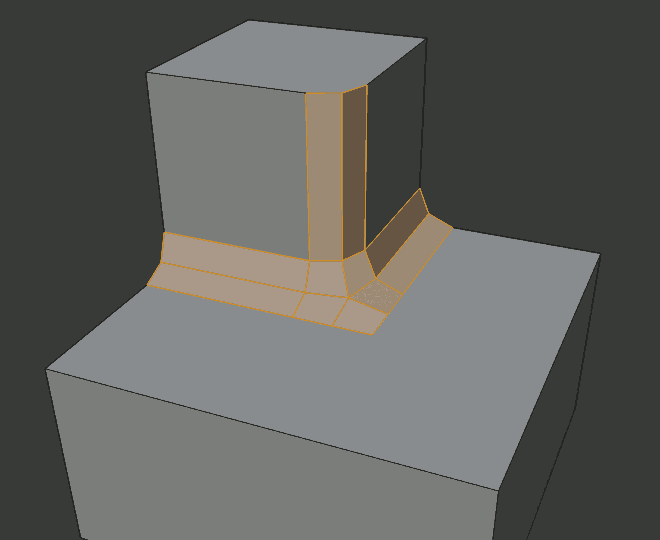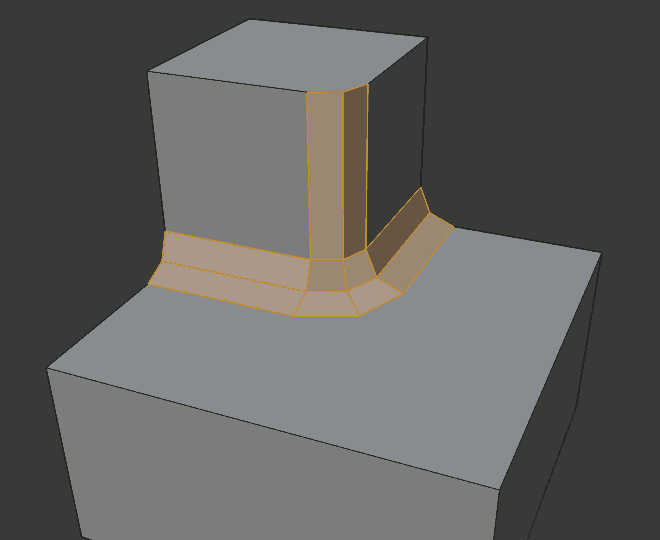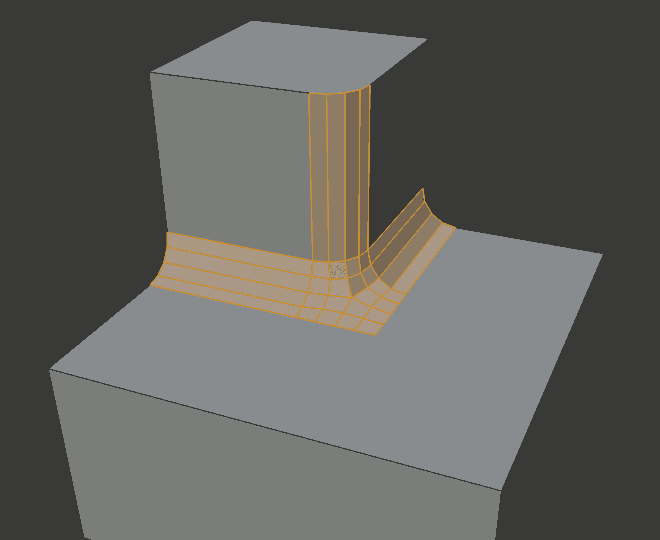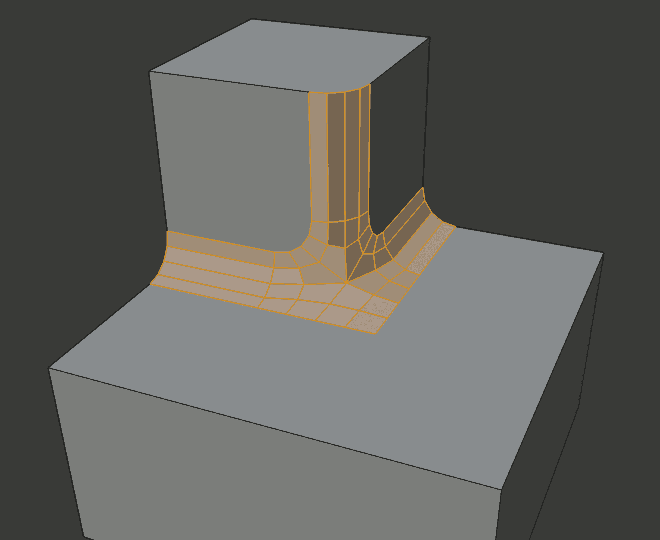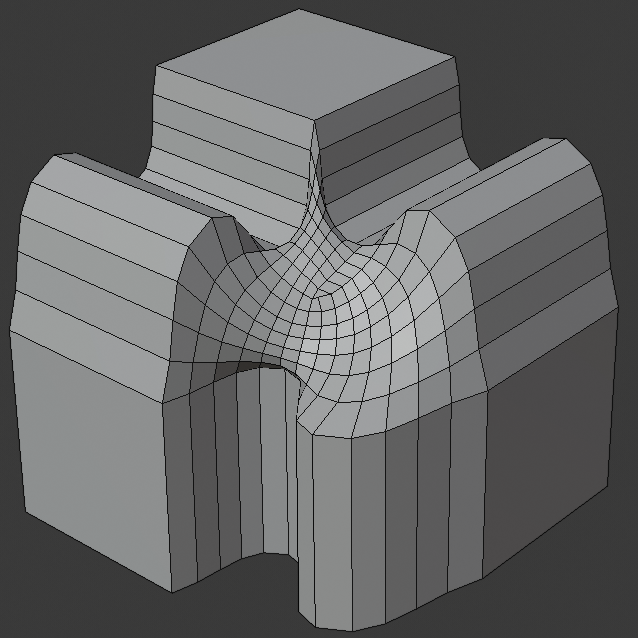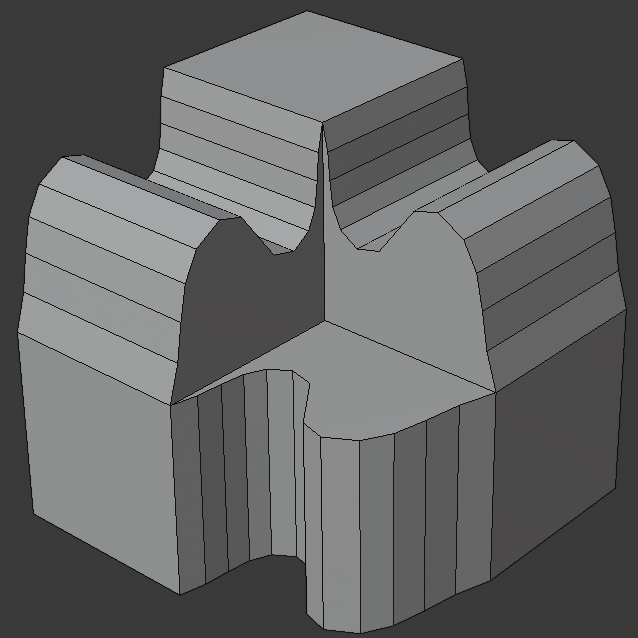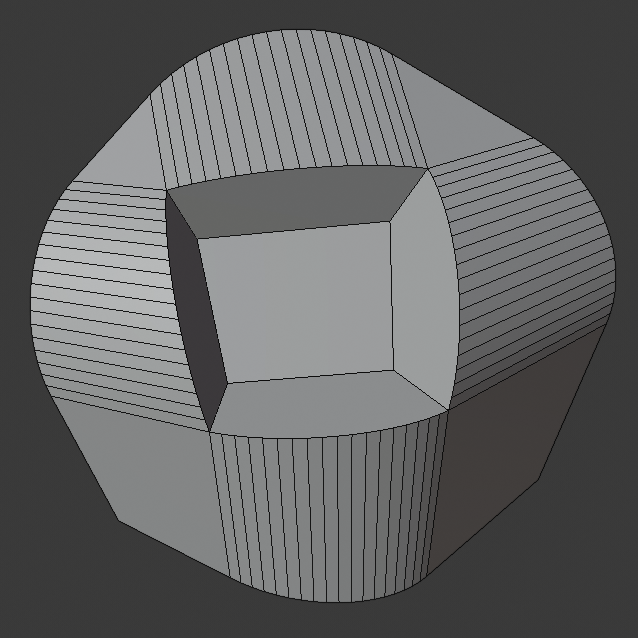Modificador Biselar¶
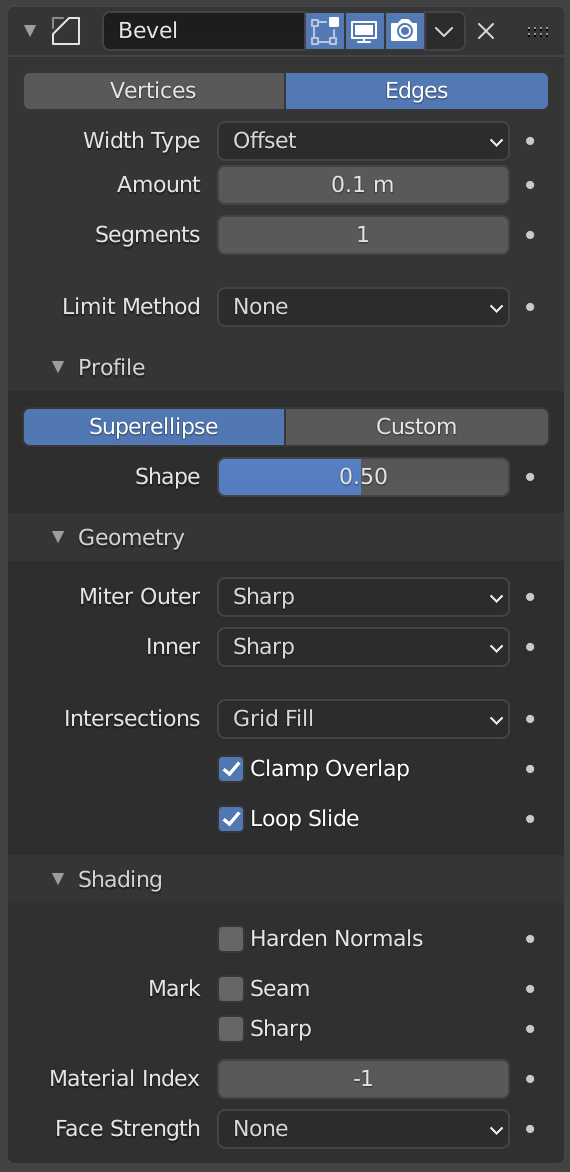
El modificador Biselar.¶
El modificador Biselar permitirá biselar los bordes de la malla a la que sea aplicado, obteniéndose control sobre la forma y el lugar en que los biseles serán aplicados en la malla.
Se trata de una alternativa no destructiva al operador Biselar del modo Edición.
Opciones¶
- Afectar
- Vértices:
Sólo las áreas cercanas a los vértices están biseladas, los bordes permanecen sin cambios.
- Bordes:
Bisela los bordes, creando intersecciones en los vértices.
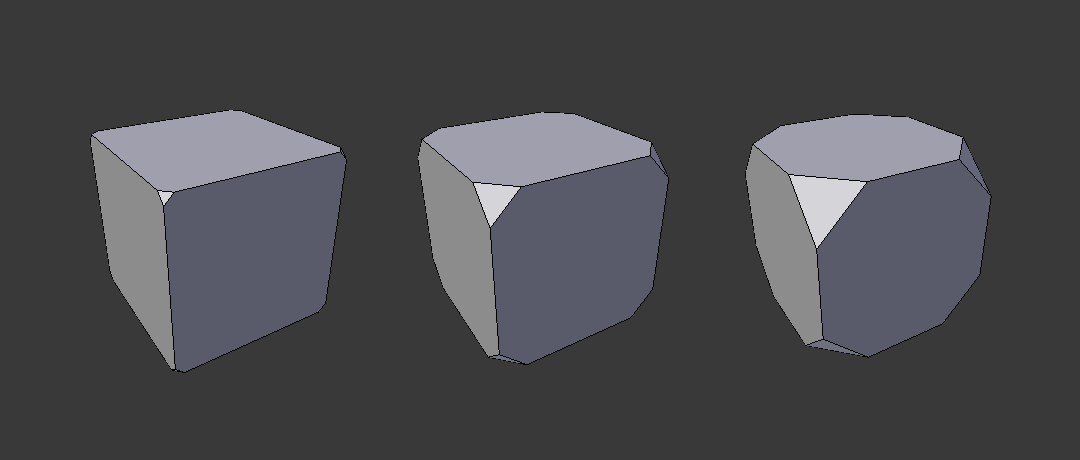
Tres cubos con bisel de 0.1, 0.3 y 0.5 de ancho, con la opción Vértices seleccionada.¶
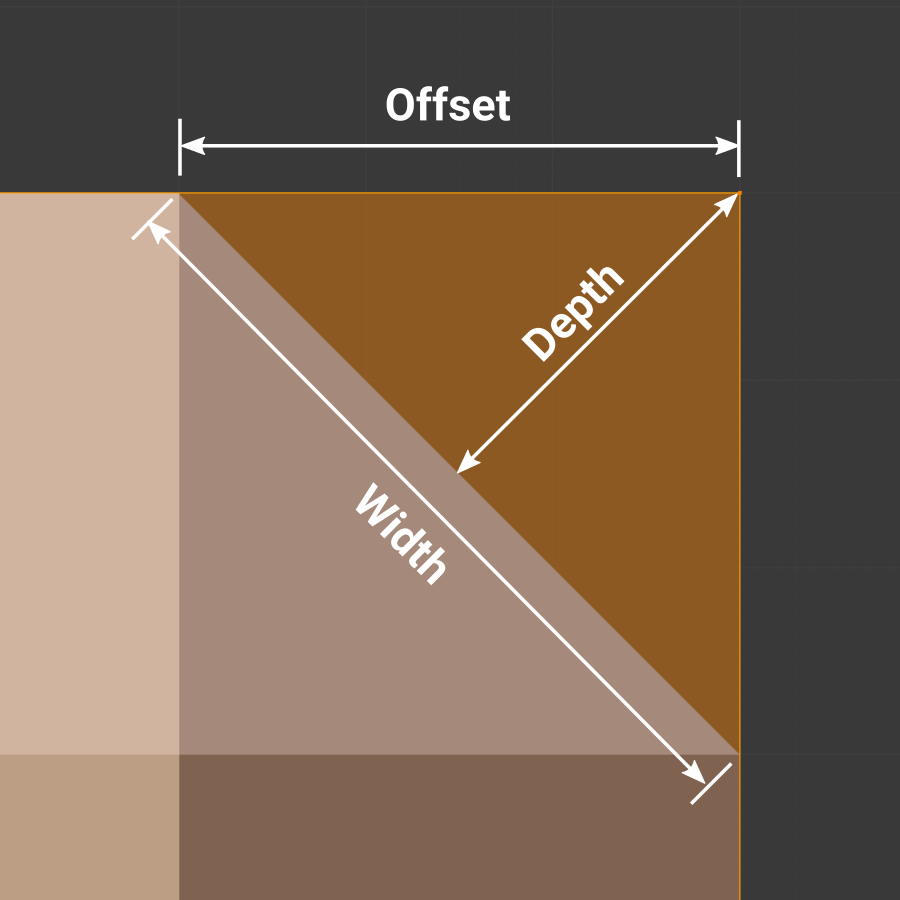
- Tipo de ancho
Defines how Width will be interpreted to determine the amount of bevel.
- Desplazamiento:
La distancia desde el nuevo borde hasta el original.
- Ancho:
La distancia entre los dos nuevos bordes formados por el bisel (o los bordes a cada lado del bisel si hubiera más de un segmento).
- Profundidad:
Value is the perpendicular distance from the new bevel face to original edge.
- Porcentaje:
The percentage of the length of adjacent edge length that the new edges slide along.
- Absoluto:
La distancia exacta a lo largo de los bordes adyacentes al borde biselado. Se verá una diferencia con Desplazamiento cuando los bordes sin biselar unidos a los bordes biselados confluyan en un ángulo que no sea recto.
- Ancho
The size of the bevel effect. See Width Method below.
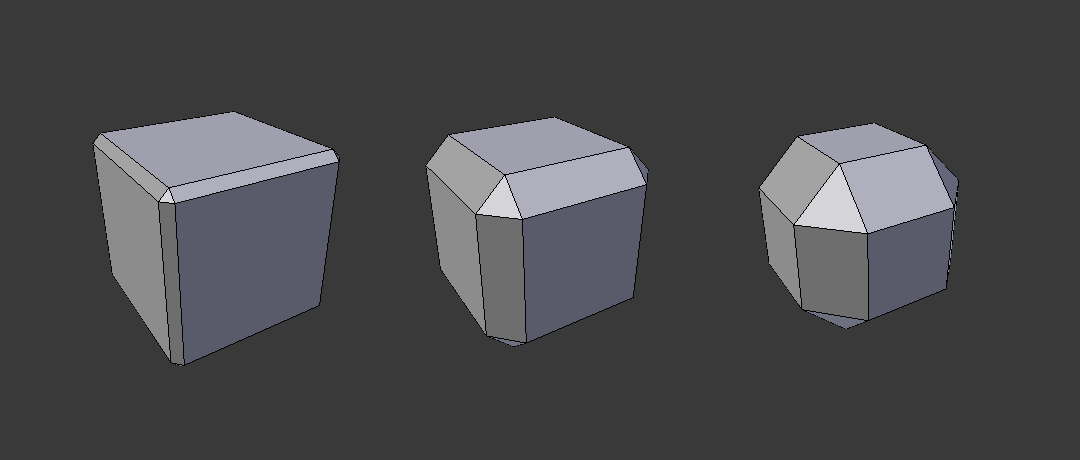
Three Cubes with 0.1, 0.3 and 0.5 bevel widths.¶
- Segmentos
The number of edge loops added along the bevel’s face.
- Método de limitación
Used to control where a bevel is applied to the mesh.
- Ninguno:
No limit, all edges will be beveled.
- Ángulo:
Only bevels edges whose angle of adjacent face normals plus the defined Angle is less than 180 degrees. Intended to allow you to bevel only the sharp edges of an object without affecting its smooth surfaces.
- Influencia:
Use an attribute to determine the width of a bevel. When the bevel weight is 0.0, no bevel is applied.
Any attribute on the input mesh can be chosen. By default the
bevel_weight_edgeandbevel_weight_vertattributes adjusted in edit mode are used. For convenience, the modifier lists the attributes from the original mesh in the dropdown, but attributes created by previous modifiers can also be used. Attributes with non-matching domains or types will be automatically interpolated to the correct type.- Grupo de vértices:
Use weights from a vertex group to determine the width of the bevel. When the vertex weight is 0.0, no bevel is applied. An edge is only beveled if both of its vertices are in the vertex group. See here about adjusting vertex group weights.
- Invertir
<-> Invierte la influencia del grupo de vértices seleccionado, lo que significa que el grupo ahora representa vértices que no serán deformados por el modificador.
Esta opción invertirá los valores de las influencias del grupo.
- Invertir
Perfil¶
Súper elipse¶
Crea un bisel con una curva cóncava o convexa uniforme.
- Forma
The shape of the bevel, from concave to convex. It has no effect if Segments is less than 2.
Perfil personalizado¶
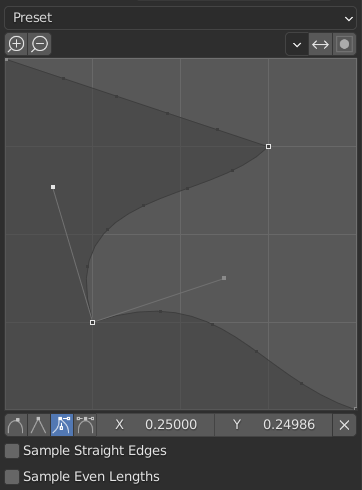
El control del perfil personalizado.¶
Este control permite la creación de un perfil definido por el usuario con más complejidad que con el parámetro de perfil único. La herramienta modal permite alternar el perfil personalizado, pero la forma del perfil sólo se puede editar en el panel de opciones después de confirmar la operación.
Se considera que el perfil comienza en la esquina inferior derecha de la gráfica y termina en la superior izquierda, como si estuviera entre dos bordes que se encuentran en ángulo recto. Los puntos de control se crearán en la gráfica y luego la curva será muestreada usando la cantidad de segmentos del modificador Biselar.
- Forma de ingletes
The shape of the miter patterns, from concave to convex. It has no effect if Segments is less than 2.
Nota
The Miter Shape slider stays active when miters are enabled because it still controls the shape of the miter profiles.
- Preajustes
Los preajustes Bucles de soporte e Intervalos se construirán dinámicamente según la cantidad de segmentos en el bisel. Si se cambiara el número de segmentos, será necesario volver a aplicar el preajuste.
- Muestreo
Samples will first be added to each control point, then if there are enough samples, they will be divided evenly between the edges. The Sample Straight Edges option toggles whether the samples are added to edges with sharp control points on either side. If there aren’t enough samples to give each edge the same number of samples, they will just be added to the most curved edges, so it is recommended to use at least as many segments as there are control points.
Geometría¶
- Inglete Exterior, Interior
A miter is formed when two beveled edges meet at an angle. On the side where the angle is greater than 180 degrees, if any, it is called an outer miter. If it is less than 180 degrees, then it is called an inner miter. The outer and inner miters can each be set to one of these patterns:
- Definido:
Los bordes confluyen en una punta aguda, sin vértices adicionales introducidos en los mismos.
- Parche:
Edges meet at a sharp point but in addition, two extra vertices are introduced near the point so that the edges and faces at the vertex may be less pinched together than what occurs in the Sharp case. This pattern does makes no sense for inner miters, so it behaves like Arc for them.
- Arco:
Two vertices are introduced near the meeting point, and a curved arc joins them together.
The Spread slider controls how far the new vertices are from the meeting point.
The Profile curve widget controls the shape of the arc.
- Dispersión
The value used to spread extra vertices apart for non-sharp miters. This option is available when Miter Inner is set to Arc.
- Intersecciones
Cuando más de dos bordes biselados confluyen en un vértice, se crea una malla como una forma de completar la intersección con la geometría generada. Esta opción controla el método utilizado para crear dicha malla.
- Rellenar con cuadrícula:
The default method for building intersections, useful when a smooth continuation of the bevel profile is desired. Without Custom Profile enabled, the curve of the profile continues through the intersection, but with a custom profile it just creates a smooth grid within the boundary of the intersection.
- Corte:
Crea una cara de remate al final de cada borde biselado que se aproxima al vértice. Esto es más útil para perfiles personalizados cuando la nueva intersección es demasiado compleja para un relleno de cuadrícula suave.
Con una intersección de tres vías, cuando las esquinas internas de las caras de los perfiles cortados se encuentran en la misma ubicación, no se crea una cara central.
La dirección de las caras de corte depende de la normal del vértice original.
- Limitar superposición
Limita el ancho de cada borde biselado para que los bordes no puedan causar intersecciones que provoquen superposiciones con el resto de la geometría.
- Deslizar bucles
If there are unbeveled edges along with beveled edges into a vertex, the bevel tries to slide along those edges when possible. Turning the option off can lead to more even bevel widths.
Sombreado¶
- Endurecer normales
Cuando esté habilitado, las normales de cara “por vértice” de las caras biseladas se ajustarán para que coincidan con las caras circundantes, mientras que las normales de las caras circundantes no se verán afectadas. Esto permitirá mantener planas a las caras circundantes (si ya lo eran antes), con las caras biseladas sombreadas suavemente en ellas. Para que este efecto funcione, la malla deberá contener un atributo de normales divididas personalizadas. Para una mayor practicidad, se creará un atributo
custom_normal, en caso de que no existiera uno ya.- Marcar
- Costura
Si un borde de costura cruza uno que no pertenezca a la costura y se los bisela a todos, esta opción mantendrá la propagación esperada de las costuras.
- Definido
Similar a Marcar costuras, pero para bordes definidos.
- Identificador de material
The index of the material slot to use for the bevel. When set to -1, the material of the nearest original face will be used.
- Intensidad de caras
Establecerá la Intensidad de caras en las caras involucradas en el bisel, de acuerdo con el modo especificado. Esto podrá ser usado junto con un modificador Influenciar normales (con la opción Influencia de caras activa).
- Ninguno:
No establece intensidad de caras.
- Nuevo/a:
Establece la intensidad de las caras nuevas a lo largo de los bordes en Medio y la intensidad de las caras nuevas en los vértices en Débil.
- Afectadas:
Además de los configurados para el caso Nuevo, también configura las caras adyacentes a las caras nuevas para que tengan intensidad Fuerte.
- Todo:
In addition to those set for the Affected case, also set all the rest of the faces of the model to have strength Strong.
